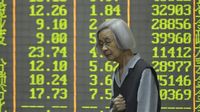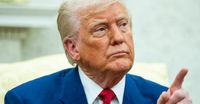As the trade landscape between the United States and China continues to shift, the recent escalation of tariffs has sparked significant concern among economists and business leaders alike. On April 9, 2025, President Donald Trump announced a dramatic increase in tariffs on Chinese imports, raising them to an astonishing 125%. This move comes in the wake of a retaliatory response from Beijing, which had previously matched U.S. tariffs at 34% on American goods, further intensifying the ongoing trade war.
In a strategic pivot, Trump reversed his broader “reciprocal” tariffs on most countries, citing fears of a recession while simultaneously focusing on China. The new tariffs have raised the cost of U.S. products sent to China to 84%, with the total tariffs on Chinese imports now reaching a staggering 145% when factoring in existing levies related to fentanyl production.
“At some point, hopefully in the near future, China will realize that the days of ripping off the U.S.A., and other countries, is no longer sustainable or acceptable,” Trump expressed on his Truth Social platform, underscoring his administration's tough stance against what it perceives as unfair trade practices.
As the U.S. and China navigate this tumultuous landscape, the stakes are higher than ever. Both nations are embroiled in a fierce competition that spans artificial intelligence, monetary policy, and global influence. The U.S.-China Business Council has urged both leaders to engage in dialogue, asserting that the sweeping tariffs could have detrimental effects on the global economy, as well as on American businesses, farmers, and consumers.
“Targeted tariffs to encourage China to come to the negotiating table are one thing, but these sweeping tit-for-tat tariffs are in no one’s interests,” the council stated, emphasizing the need for a diplomatic resolution.
Despite the escalating tensions, China has made it clear that it does not intend to capitulate to U.S. pressure. An editorial in the ruling party’s flagship newspaper, People’s Daily, reassured the Chinese populace that “the sky will not fall,” indicating a confidence in their ability to withstand the economic fallout. The Chinese leadership has developed a comprehensive toolkit of responses, including tariffs and regulatory controls, to counteract U.S. measures and maintain economic stability.
“We have been in a trade war with the United States for eight years and have accumulated rich struggle experience,” the editorial stated, reflecting the resolve of the Chinese government to resist U.S. demands.
In a similar vein, the official Xinhua News Agency reiterated that while China does not desire a trade war, it is prepared to engage in one if necessary. “There are no winners in a trade war,” it warned, emphasizing the mutual detriment of such conflicts.
On the U.S. side, Trump’s administration has signaled an openness to negotiations, with Treasury Secretary Scott Bessent asserting that the tariffs were part of a long-term strategy to compel China to the negotiating table. “This escalation is a loser for them,” Bessent remarked, highlighting the disproportionate trade balance between the two nations, where U.S. exports to China are significantly lower than imports.
While Trump has been adamant about his approach, stating, “I know what the hell I’m doing,” the economic implications of the tariffs are becoming increasingly evident. Economists are warning that the U.S. could be heading toward a recession, with many now considering the odds to be a coin flip.
In the political arena, Trump’s tariffs have drawn criticism from both sides of the aisle. Democrats have seized upon the situation to argue that the president is mismanaging the economy, with Senator Ron Wyden stating that “the U.S. economy has gone from the envy of the world to a laughingstock.”
On the Republican side, there is growing concern among lawmakers about the impact of tariffs on their constituents, particularly in the agricultural sector. During Trump’s first term, retaliatory tariffs from China led to a significant decline in U.S. agricultural exports, prompting the government to spend approximately $23 billion to support American farmers.
In a bid to regain some control over trade policy, Representatives Don Bacon and Jeff Hurd introduced a bipartisan bill that would require congressional approval for any proposed tariffs. This move reflects a desire among some lawmakers to ensure that trade policy is crafted with broader input and consideration of its economic impact.
As the situation evolves, the White House remains firm in its belief that the U.S. holds the upper hand in negotiations. “America does not need other countries as much as other countries need us,” said White House Press Secretary Karoline Leavitt, reinforcing the administration's stance on trade superiority.
However, the reality of the trade war suggests that both nations are entrenched in a conflict that may not yield easy solutions. With neither side willing to back down, the potential for further economic damage looms large. Experts warn that the ongoing trade tensions could spill into other domains, exacerbating geopolitical instability and impacting global markets.
As the U.S. and China continue to face off over tariffs, the path to resolution remains fraught with challenges. Each nation is testing the limits of its economic power, leading to a precarious situation that could have lasting repercussions not just for their economies, but for the global economy as a whole.





